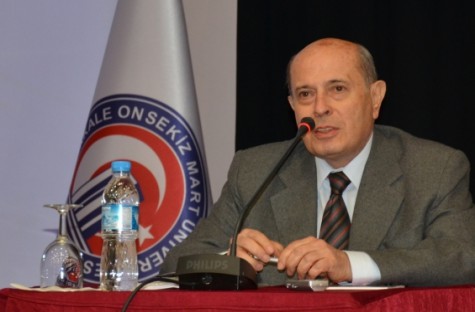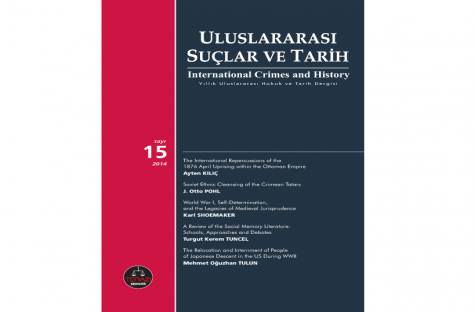
Ömer Engin LÜTEM
R. Ambassador
In our most recent article (April 7), we had indicated that the S.RES.410 on the recognition of the claims of Armenian genocide by the US and Turkey and the commemoration of it in the US would be put to vote within two weeks, since the commemoration will take place on April 24 of this year.
As expected, the draft resolution was put on the agenda of the Senate Foreign Affairs Committee on April 10, and within the same day was adopted with some revisions by 12 votes to 5, after which it was sent to the Senate Plenary Meeting for the final voting.
All of the Democrat members in the committee voted in favor of the draft resolution, who were joined by two Republican senators. All of the members who voted against it were Republicans.
This situation demonstrates that in general the Republicans continue their stance on not paying much attention to the demands of ethnic groups.
This fact will have importance in the next year when the Armenian demands are expected to reach their zenith.
Head of the Foreign Affairs Committee Robert Menendez, who always behaves virtually like an Armenian militant, played the main role in the adoption of the draft resolution.
Menendez, by the way, made the draft resolution easier to adopt by removing the part about the recognition of Armenian genocide claims by Turkey.
In the proposal, Turkey establishing balanced, constructive, stable and sustainable relations with Armenia has been tied to its recognition of the genocide claims, and in fact, this has been turned into a precondition.
However, Armenia signed the protocols establishing normal relations with Turkey without such a precondition. This precondition therefore does not conform to Armenia’s views.
On the other hand, this part of the draft resolution conforms to the Armenia diaspora’s views, since generally speaking the idea of not establishing relations with Turkey unless it recognizes the claims of genocide is prevalent in the Diaspora.
Yet, Menendez had to remove this part in order for the draft resolution to be adopted.
Even after such revisions, however, this draft resolution is still unacceptable for Turkey because it includes statements on the remembrance and the commemoration of the Armenian genocide, which are aimed at the recognition of the Armenian genocide claims by the US Senate.
We mentioned above that the draft resolution was sent to the Senate Plenary Meeting after its adoption; but on the next day (April 11) the Senate was to close down for the Easter Holiday until April 28, which posed a serious obstacle for the draft resolution since it left only one day for its discussion.
Nonetheless, the Democrats constitute the majority in the Senate and thus they, if they wanted to, could have had the draft resolution discussed and adopted. The draft resolution, however, was not put on the agenda.
There might be two explanations for this situation.
Firstly, Senate, which has a busy agenda, did not deem the draft resolution on the Armenian genocide claims important enough to give it a priority.
Secondly, it might be that it was not wanted for the draft resolution to be adopted at this point in time.
The Senate would therefore not come into conflict with the President, and by succeeding in having the draft resolution adopted in the Foreign Affairs Committee, a warning might have been sent to Turkey by implying that the draft resolution can be adopted in the Senate.
A recent event supports this possibility. Robert Menendez brought this draft resolution to the Foreign Affairs Committee the day before the Senate was to close down for the holiday. As the head of the committee, however, he could have put the draft resolution on the agenda and had it adopted, and thus could have allowed the Senate to discuss it without time constraints. The fact that the draft resolution was sent to the Senate the day before it was to close down for the holiday led to it not being put on the agenda.
Armenian Americans have so far exhibited no reaction to this situation. It possible, however, that some of them are thinking that they have been betrayed or at the least are being stalled.
So what is going to happen after this point?
Under normal circumstances, the draft resolution must be put on the agenda and be discussed in the Senate on April 28. There will be no use for the draft resolution being adopted on this date, however, since the draft resolution contains the statement about the remembrance and the commemoration of the Armenian genocide on its anniversary on April 24, 2014. As such, the current draft resolution must be revised or a new one must be prepared, which will take time. Taking note of the importance that Armenians attach to the year 2015, it is possible that the draft resolution will be postponed to next year.
© 2009-2025 Center for Eurasian Studies (AVİM) All Rights Reserved
No comments yet.
-
FUTURE OF THE TURKEY-ARMENIA PROTOCOLS
Ömer Engin LÜTEM 24.01.2010 -
THE AFTERMATH OF APRIL 24
Ömer Engin LÜTEM 11.05.2015 -
THE MONUMENT IN OTTAWA
Ömer Engin LÜTEM 23.09.2012 -
THE RESOLUTION OF THE SWEDISH PARLIAMENT
Ömer Engin LÜTEM 11.03.2010 -
MEETINGS IN THE UNITED STATES
Ömer Engin LÜTEM 13.04.2010
-
 INTRODUCING RELIGION INTO A LEGAL AND HISTORICAL DISPUTE
INTRODUCING RELIGION INTO A LEGAL AND HISTORICAL DISPUTE
Mehmet Oğuzhan TULUN 12.04.2015 -
 A NEW PUBLICATION BY AVIM: ARMENIAN DIASPORA
A NEW PUBLICATION BY AVIM: ARMENIAN DIASPORA
AVİM 07.01.2015 -
 CALL FOR PAPERS - INTERNATIONAL CRIMES AND HISTORY SPECIAL ISSUE: CRIMEAN TATARS UNDER RUSSIAN IMPERIAL AND SOVIET RULES
CALL FOR PAPERS - INTERNATIONAL CRIMES AND HISTORY SPECIAL ISSUE: CRIMEAN TATARS UNDER RUSSIAN IMPERIAL AND SOVIET RULES
Turgut Kerem TUNCEL 08.08.2015 -
 HOW SHOULD WE UNDERSTAND THE “CRIMSON APPLE”?
HOW SHOULD WE UNDERSTAND THE “CRIMSON APPLE”?
Şevval Beste GÖKÇELİK 22.09.2021 -
THE COLLECTIVE SECURITY ORGANISATION SUMMIT IN KYRGYZSTAN
Alev KILIÇ 29.05.2013
-
25.01.2016
THE ARMENIAN QUESTION - BASIC KNOWLEDGE AND DOCUMENTATION -
12.06.2024
THE TRUTH WILL OUT -
27.03.2023
RADİKAL ERMENİ UNSURLARCA GERÇEKLEŞTİRİLEN MEZALİMLER VE VANDALİZM -
17.03.2023
PATRIOTISM PERVERTED -
23.02.2023
MEN ARE LIKE THAT -
03.02.2023
BAKÜ-TİFLİS-CEYHAN BORU HATTININ YAŞANAN TARİHİ -
16.12.2022
INTERNATIONAL SCHOLARS ON THE EVENTS OF 1915 -
07.12.2022
FAKE PHOTOS AND THE ARMENIAN PROPAGANDA -
07.12.2022
ERMENİ PROPAGANDASI VE SAHTE RESİMLER -
01.01.2022
A Letter From Japan - Strategically Mum: The Silence of the Armenians -
01.01.2022
Japonya'dan Bir Mektup - Stratejik Suskunluk: Ermenilerin Sessizliği -
03.06.2020
Anastas Mikoyan: Confessions of an Armenian Bolshevik -
08.04.2020
Sovyet Sonrası Ukrayna’da Devlet, Toplum ve Siyaset - Değişen Dinamikler, Dönüşen Kimlikler -
12.06.2018
Ermeni Sorunuyla İlgili İngiliz Belgeleri (1912-1923) - British Documents on Armenian Question (1912-1923) -
02.12.2016
Turkish-Russian Academics: A Historical Study on the Caucasus -
01.07.2016
Gürcistan'daki Müslüman Topluluklar: Azınlık Hakları, Kimlik, Siyaset -
10.03.2016
Armenian Diaspora: Diaspora, State and the Imagination of the Republic of Armenia -
24.01.2016
ERMENİ SORUNU - TEMEL BİLGİ VE BELGELER (2. BASKI)
-
AVİM Conference Hall 24.01.2023
CONFERENCE TITLED “HUNGARY’S PERSPECTIVES ON THE TURKIC WORLD"









